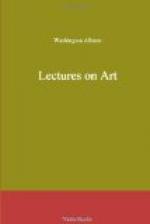It would seem, then, since this living cement which is diffused through nature, binding all things in one, so that no part can be contemplated that does not, of necessity, even though unconsciously to us, act on the mind with reference to the whole,—since this, as we find, cannot be transferred to any copy of the actual, it must needs follow, if we would imitate Nature in its true effects, that recourse must be had to another, though similar principle, which shall so pervade our production as to satisfy the mind with an efficient equivalent. Now, in order to this there are two conditions required: first, the personal modification, (already discussed) of every separate part,—which may be considered as its proper life; and, secondly, the uniting of the parts by such an interdependence that they shall appear to us as essential, one to another, and all to each. When this is done, the result is a whole. But how do we obtain this mutual dependence? We refer the questioner to the law of Harmony,—that mysterious power, which is only apprehended by its imperative effect.
But, be the above as it may, we know it to be a fact, that, whilst nothing in Nature ever affects us as fragmentary, no unmodified copy of her by man is ever felt by us as otherwise.
We have thus—and, we trust, on no fanciful ground—endeavoured to establish the real and distinctive character of Art. And, if our argument be admitted, it will be found to have brought us to the following conclusions:—first, that the true ground of all originality lies in the individualizing law, that is, in that modifying power, which causes the difference between man and man as to their mental impressions; secondly, that only in a true reproduction consists its evidence; thirdly, that in the involuntary response from other minds lies the truth of the evidence; fourthly, that in order to this response there must therefore exist some universal kindred principle, which is essential to the human mind, though widely differenced in the degree of its activity in different individuals; and finally, that this principle, which we have here denominated Human or Poetic Truth, being independent both of the will and of the reflective faculties, is in its nature imperative, to affirm or deny, in relation to every production pretending to Art, from the simple imitation of the actual to the probable, and from the probable to the possible;—in one word, that the several characteristics, Originality, Poetic Truth, Invention, each imply a something not inherent in the objects imitated, but which must emanate alone from the mind of the Artist.




